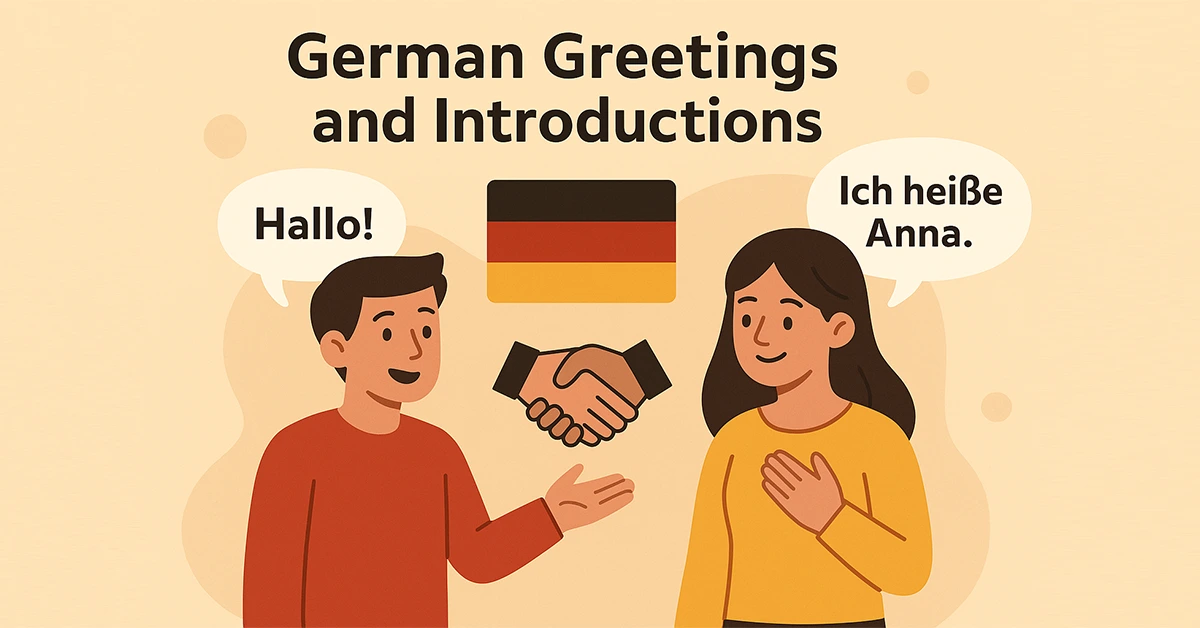German Greetings and Introductions

Learning German greetings and introductions is the first step to making a good impression when speaking German. Whether you’re visiting Germany, starting a new job, or meeting someone new, knowing how to greet and introduce yourself appropriately can set the tone for a successful interaction.
Top German Greetings for Every Situation (Formal & Informal)
Here are the most common German greetings, both formal and informal, with their English translations and pronunciations:
- Hallo – Hello (IPA: /ˈhaloː/) – informal
- Guten Morgen – Good morning (IPA: /ˈɡuːtn̩ ˈmɔʁɡn̩/) – formal/informal
- Guten Tag – Good day (IPA: /ˈɡuːtn̩ taːk/) – formal
- Guten Abend – Good evening (IPA: /ˈɡuːtn̩ ˈʔaːbn̩t/) – formal
- Hi – Hi (IPA: /haɪ̯/) – informal
- Grüß dich – Hello (to one person, IPA: /ɡʁyːs dɪç/) – informal
- Grüß Gott – God greet you (IPA: /ɡʁyːs ɡɔt/) – formal, southern Germany/Austria
Formal vs Informal German Greetings – When to Use Each
In German, it’s important to distinguish between formal and informal greetings. Use formal greetings in professional settings or when meeting someone for the first time. Use informal greetings with friends, family, or young people.
| Formal | Informal |
|---|---|
| Guten Tag | Hallo |
| Guten Abend | Hi |
| Grüß Gott | Grüß dich |
How to Introduce Yourself in German
To introduce yourself in German, use these phrases:
- Ich heiße Maria. – My name is Maria. (IPA: /ɪç ˈhaɪ̯sə maˈʁiːa/)
- Ich bin Lehrer. – I’m a teacher. (IPA: /ɪç bɪn ˈleːʁɐ/)
- Ich komme aus Frankreich. – I come from France. (IPA: /ɪç ˈkɔmə aʊ̯s ˈfʁaŋkʁaɪ̯ç/)
German Phrases for First Meetings and Making a Good Impression
Use these polite expressions during first meetings:
- Schön, Sie kennenzulernen. – Nice to meet you. (IPA: /ʃøːn ziː ˈkɛnənˌtsuːˌlɛʁnən/)
- Wie geht es Ihnen? – How are you? (formal) (IPA: /viː ɡeːt ɛs ˈiːnən/)
- Angenehm. – Pleased to meet you. (IPA: /ˈaŋɡəneːm/)
German Greeting Etiquette – Do’s and Don’ts
- Do shake hands in formal settings.
- Do use titles (e.g., Herr, Frau) when greeting someone formally.
- Don’t use “du” unless invited to.
- Don’t greet someone you don’t know with a hug.
Listen and Repeat: Audio Examples of Common German Greetings
Use online tools or language apps to hear and repeat greetings like “Guten Tag”, “Hallo”, and “Grüß Gott”. Practicing out loud improves pronunciation.
Practice German Dialogues for First Encounters
Example conversation:
A: Guten Tag! Ich heiße Paul. Und Sie? B: Hallo, ich heiße Julia. Schön, Sie kennenzulernen.
Translation:
A: Good day! My name is Paul. And you? B: Hello, my name is Julia. Nice to meet you.
FAQs: German Greetings and Self-Introductions Explained
- Is “Hallo” always informal? – Yes, usually among friends and family.
- Can I say “Hi” in Germany? – Yes, it’s common among young people.
- When should I use “Sie” vs “du”? – Use “Sie” formally and “du” with people you know well.
Common Responses to German Greetings
- Wie geht’s? – How are you? (informal)
- Gut, danke. Und dir? – Good, thanks. And you? (informal)
- Sehr gut, danke. Und Ihnen? – Very good, thank you. And you? (formal)
Regional Variations in German Greetings
Different regions use different greetings. In Bavaria and Austria, “Grüß Gott” is common. In northern Germany, “Moin” is used throughout the day.
How to Say Goodbye in German – Farewell Phrases
- Auf Wiedersehen – Goodbye (formal) (IPA: /aʊ̯f ˈviːdɐˌzeːən/)
- Tschüss – Bye (informal) (IPA: /tʃʏs/)
- Bis später – See you later (IPA: /bɪs ˈʃpɛːtɐ/)
Downloadable PDF: German Greetings and Introductions Cheat Sheet
Click here to download your printable PDF with essential German greetings and introductions for easy reference.
Conclusion: Greet and Introduce Yourself in German with Confidence
Mastering German greetings and introductions helps you communicate clearly and respectfully in any social setting. Start practicing these phrases daily to build your confidence and sound more like a native speaker!